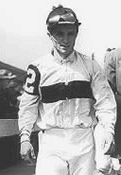♘امیرحسین♞
♘ مدیریت انجمن اسب ایران ♞
Dead Jockey Rides to Victory (May 8, 1936)
Today in Odd History, Ralph Neves' life was cut tragically short at Bay Meadows Racecourse, near San Francisco, California. The 19-year-old jockey was coming into the final stretch of the third race of the day when his horse, Fannikins, tripped. She and her rider crashed through the wooden fence. Fannikins was unharmed, but Neves, who had not only broken his own mount's fall, but had also been trampled by four other horses, was dead. The track physician, assisted by two doctors who had come down from the stands when they saw Neves fall, loaded the body into an ambulance, and the race announcer called for a moment of silence. But the shocked, grieving spectators had underestimated Neves.
Doctors at the hospital did everything they could think of to revive Neves, but to no avail. By the time his friend Dr. Horace Stevens arrived, he had already been toe-tagged and sent to the morgue. Stevens, though, was not quite ready to give up. He administered a shot of adrenaline directly into Neves' heart. It had no effect. Sadly, he replaced the white sheet that covered his friend's lifeless body, and left him there. Had he waited just a few more minutes, he would have witnessed a miracle. The dead jockey arose from the chilly slab, shirtless, bloodied, shrouded in the morgue sheet and wearing a single boot. He staggered out of the hospital and hailed a cab to take him back to the racetrack.
Pandemonium broke out as Neves sprinted past the grandstand at Bay Meadows, half-dressed and still trailing his toe tag. "At one point," he said later, "I think everyone on the damn track was chasing me." He fought his way through the crowd and burst into the jockeys' room, where his colleagues were conducting a collection for his widow. She fainted at the sight of her newly resurrected husband, standing in the doorway demanding to be allowed to ride. He insisted that he didn't feel dead, but the stewards still refused to let him compete again that day. The following day, though, he rode five winners and claimed the meet's top prize--a $500 watch donated by Bing Crosby.
Neves' dramatic recovery was typical of "The Portuguese Pepperpot," a man whom fellow jockey Charlie Whittington once described as "wilder than a peach orchard boar." Neves rode for 28 more years, racking up nearly 4,000 wins on more than 25,000 horses. In 1960, he was inducted into the National Museum of Racing's Hall of Fame. He died in his sleep in 1995, at the age of 79. He did not rise again.
Doctors at the hospital did everything they could think of to revive Neves, but to no avail. By the time his friend Dr. Horace Stevens arrived, he had already been toe-tagged and sent to the morgue. Stevens, though, was not quite ready to give up. He administered a shot of adrenaline directly into Neves' heart. It had no effect. Sadly, he replaced the white sheet that covered his friend's lifeless body, and left him there. Had he waited just a few more minutes, he would have witnessed a miracle. The dead jockey arose from the chilly slab, shirtless, bloodied, shrouded in the morgue sheet and wearing a single boot. He staggered out of the hospital and hailed a cab to take him back to the racetrack.
Pandemonium broke out as Neves sprinted past the grandstand at Bay Meadows, half-dressed and still trailing his toe tag. "At one point," he said later, "I think everyone on the damn track was chasing me." He fought his way through the crowd and burst into the jockeys' room, where his colleagues were conducting a collection for his widow. She fainted at the sight of her newly resurrected husband, standing in the doorway demanding to be allowed to ride. He insisted that he didn't feel dead, but the stewards still refused to let him compete again that day. The following day, though, he rode five winners and claimed the meet's top prize--a $500 watch donated by Bing Crosby.
Neves' dramatic recovery was typical of "The Portuguese Pepperpot," a man whom fellow jockey Charlie Whittington once described as "wilder than a peach orchard boar." Neves rode for 28 more years, racking up nearly 4,000 wins on more than 25,000 horses. In 1960, he was inducted into the National Museum of Racing's Hall of Fame. He died in his sleep in 1995, at the age of 79. He did not rise again.

